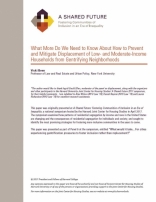A SHARED FUTURE: WHAT MORE DO WE NEED TO KNOW ABOUT HOW TO PREVENT AND MITIGATE DISPLACEMENT OF LOW- AND MODERATE-INCOME HOUSEHOLDS FROM GENTRIFYING NEIGHBORHOODS?
While local governments, land use and housing officials, and affordable housing providers and advocates are scrambling to find effective ways to counter concerns about displacement, urban policy researchers have thus far found little evidence that lower-income renters move from gentrifying neighborhoods at higher rates than they move from non-gentrifying areas. Moreover, researchers generally have not thoroughly assessed the efficacy of many policies that jurisdictions use to address concerns about gentrification and displacement. This paper reviews what is known—and what is unknown—about the six strategies that comprise the current "toolkit" for addressing gentrification and displacement. These are: preservation of existing affordable rental units; protections of long-time residents who wish to stay in the neighborhood; inclusion to ensure that a share of new development is affordable; revenue generation that harnesses growth to expand financial resources for affordable housing; and property acquisition of sites for affordable housing. She concludes by noting that policymakers considering potential remedies should be mindful of how little we know about the problem or potential solutions. That is not to say that jurisdictions should ignore the tools available; rather, the point is that researchers could provide significant value to policymakers by helping to fill some of the gaps.

